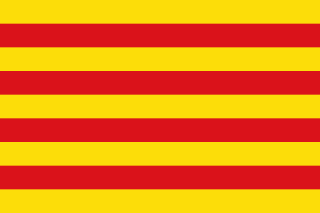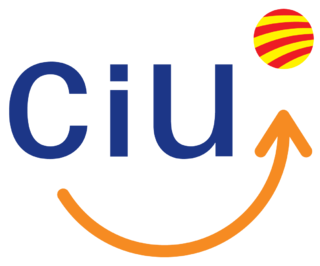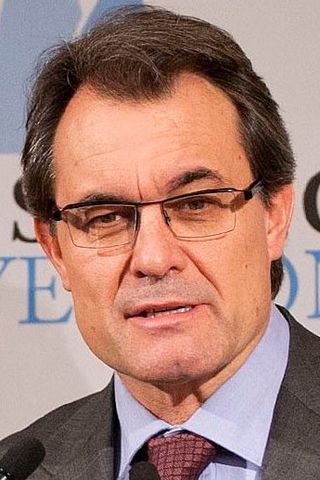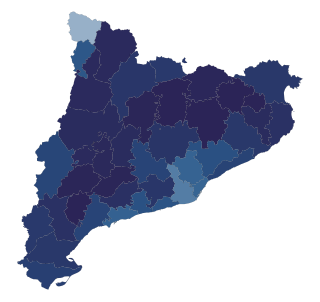| |||||
| Decades: | |||||
|---|---|---|---|---|---|
| See also: | |||||
Events from 2012 in Catalonia .
| |||||
| Decades: | |||||
|---|---|---|---|---|---|
| See also: | |||||
Events from 2012 in Catalonia .

Catalan nationalism promotes the idea that the Catalan people form a distinct nation and national identity. A related term is Catalanism, which tends to have a wider meaning, as some people define themselves as Catalanist but not Catalan nationalist.

Convergence and Union was a Catalan nationalist electoral alliance in Catalonia, Spain. It was a federation of two constituent parties, the larger Democratic Convergence of Catalonia (CDC) and its smaller counterpart, the Democratic Union of Catalonia (UDC). It was dissolved on 18 June 2015.

Artur Mas i Gavarró is a Catalan politician. He was president of the Government of Catalonia from 2010 to 2015 and acting president from September 2015 to 12 January 2016.

The Catalan independence movement is a social and political movement which seeks the independence of Catalonia from Spain.
The Statute of Autonomy of Catalonia of 2006 provides Catalonia's basic institutional regulations under the Spanish Constitution of 1978. It defines the rights and obligations of the citizens of Catalonia, the political institutions of the Catalan community, their competences and relations with the rest of Spain, and the financing of the Government of Catalonia.

The Assemblea Nacional Catalana is an organization that seeks the political independence of Catalonia from Spain. It also promotes the independence of other Catalan-speaking regions, which are collectively known as the Catalan Countries.

The 2012 Catalan independence demonstration was a protest which occurred in central Barcelona in Catalonia, Spain, on 11 September 2012 during the National Day of Catalonia. The protestors demanded the independence of Catalonia and its establishment as a sovereign state under the slogan "Catalonia, new state in Europe". It was organized by the Catalan National Assembly (ANC) and headed together with the Association of Municipalities for Independence as the most prominent of a series of events known as "March towards Independence" which began on 30 June 2012 in Lleida.

The 2012 Catalan regional election was held on Sunday, 25 November 2012, to elect the 10th Parliament of the autonomous community of Catalonia. All 135 seats in the Parliament were up for election. It was a snap election, announced on 25 September by President Artur Mas following the pro-independence demonstration in Barcelona on 11 September—the National Day of Catalonia—and the failed talks between President Mas and Prime Minister Mariano Rajoy to give greater fiscal autonomy to Catalonia.

Oriol Junqueras i Vies is a Catalan politician and historian. A former mayor of the municipality of Sant Vicenç dels Horts in Catalonia, Junqueras served as Vice President of Catalonia from January 2016 to October 2017, when he was removed from office following the Catalan declaration of independence and entered prison until June 2021 for his role in organizing the 2017 Catalan independence referendum. He is president of the Republican Left of Catalonia (ERC). Born in 1969 in Barcelona, Junqueras grew up in the municipality of Sant Vicenç dels Horts. After graduating from the Autonomous University of Barcelona, he taught history at the university.

A non-binding Catalan self-determination referendum, also known as the Citizen Participation Process on the Political Future of Catalonia, was held on Sunday, 9 November 2014, to gauge support on the political future of Catalonia. While also referred to as "Catalan independence referendum", the vote was rebranded as a "participation process" by the Government of Catalonia, after a "non-referendum popular consultation" on the same topic and for the same date had been suspended by the Constitutional Court of Spain.

The 2015 Catalan regional election was held on Sunday, 27 September 2015, electing the 11th Parliament of the autonomous community of Catalonia. All 135 seats in the Parliament were up for election. This was the third regional Catalan election in only five years, after the 2010 and 2012 elections and the first one in over 37 years in which Democratic Convergence of Catalonia (CDC) and Democratic Union of Catalonia (UDC) ran separately, after the dissolution of Convergence and Union (CiU) in June 2015 over disagreements on the coalition's separatist turn.

Junts pel Sí was a Catalan electoral, political and parliamentary alliance focused on achieving the independence of Catalonia from Spain. Established ahead of the 2015 Catalan regional election, it was formed by Democratic Convergence of Catalonia (CDC), Republican Left of Catalonia (ERC), Democrats of Catalonia (DC), Left Movement (MES) and Independence Rally (RI.cat), as well as a number of independent personalities from pro-independence sectors of civil society, including the pro-independence organizations Catalan National Assembly, Òmnium and the Association of Municipalities for Independence. The Popular Unity Candidacy (CUP) had been invited to participate in the alliance, but refused to do so and ran on its own instead, citing its disagreement with the presence of politicians in the list.

The 2017 Catalan regional election was held on Thursday 21 December 2017 to elect the 12th Parliament of the autonomous community of Catalonia. All 135 seats in the Parliament were up for election. The election was called by Spanish prime minister Mariano Rajoy after the invocation of Article 155 of the 1978 Spanish Constitution to enforce direct rule in Catalonia and the subsequent dismissal of the Catalan government under President Carles Puigdemont. The three pro-Catalan independence parties won a slim majority of parliamentary seats, claiming 70 out of 135, but fell short of a majority in the popular vote by securing 47.6% of the share.
Republican Left of Catalonia–Catalonia Yes was a Catalan pro-independence electoral alliance. The alliance was formed by Republican Left of Catalonia, Catalonia Yes and independents, and in the 2015 and 2016 Spanish general elections it was led by Gabriel Rufián.
An independence referendum was held on 1 October 2017 in the Spanish autonomous community of Catalonia, passed by the Parliament of Catalonia as the Law on the Referendum on Self-determination of Catalonia and called by the Generalitat de Catalunya. The referendum, known in the Spanish media by the numeronym 1-O, was declared unconstitutional on 7 September 2017 and suspended by the Constitutional Court of Spain after a request from the Spanish government, who declared it a breach of the Spanish Constitution. Additionally, in early September the High Court of Justice of Catalonia had issued orders to the police to try to prevent the unconstitutional referendum, including the detention of various persons responsible for its preparation. Due to alleged irregularities during the voting process, as well as the use of force by the National Police Corps and Civil Guard, international observers invited by the Generalitat declared that the referendum failed to meet the minimum international standards for elections.

National Day for Yes was a gathering in Barcelona on 11 September 2017, the National Day of Catalonia, in support of Catalan independence. It was organized by the Catalan National Assembly (ANC), the main civil society organisations behind the massive pro-independence demonstrations held since 2012.

A constitutional crisis took place in Spain from 2017 to 2018 as the result of a political conflict between the Government of Spain and the Generalitat de Catalunya under the then-President Carles Puigdemont —the government of the autonomous community of Catalonia until 28 October 2017— over the issue of Catalan independence. It started after the law intending to allow the 2017 Catalan independence referendum was denounced by the Spanish government under Prime Minister Mariano Rajoy and subsequently suspended by the Constitutional Court until it ruled on the issue. Some international media outlets have described the events as "one of the worst political crises in modern Spanish history".
As a result of the advisory 2017 Catalan independence referendum, reactions came from a multitude of avenues, including the domestic central state and other official bodies, as well as international commentary. Whilst the government and non-government community in Catalonia defended the vote, most of the international community either defended Spain's "territorial integrity" or simply criticised the central police's overhanded response. Other sub-national entities also supported Catalonia.

Meritxell Borràs i Solé is a Spanish politician and pharmacist from Catalonia. Borràs served as Catalonia's Minister of Governance and Institutional Relations from June 2015 to October 2017 when she was removed from office following the Catalan declaration of independence.

The sentencing of nine Catalan independence leaders in a 2019 trial by the Supreme Court of Spain triggered protests in Catalonia. They were convicted of sedition and other crimes against the Spanish state for their role in the organization of the 2017 Catalan independence referendum.